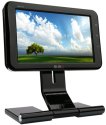USB display technology heading for Linux
May 15, 2009 — by Eric Brown — from the LinuxDevices Archive — 8 views Linux users should soon be able to use USB-connected monitors that incorporate DisplayLink's chips. DisplayLink has released Linux versions of its USB monitor source code under LGPL, and has partnered with Novell and the Linux Driver Project to develop drivers for desktops and mobile devices.
Linux users should soon be able to use USB-connected monitors that incorporate DisplayLink's chips. DisplayLink has released Linux versions of its USB monitor source code under LGPL, and has partnered with Novell and the Linux Driver Project to develop drivers for desktops and mobile devices.
(Click for larger view of the DisplayLink-enabled Mimo 710 USB-connected monitor)
DisplayLink's chips are embedded in a growing number of USB-connected monitors, such as Mimo Monitors' little Mimo 710 (pictured above), enabling one or more high resolution displays to be connected via a standard USB 2.0 port. The technology is also found in universal docking stations, projectors, and adapters, says DisplayLink.
Previously available only on Windows and Mac, the drivers can now be developed for Linux devices now that the source code library has been released under GNU Lesser General Public License v2 (LGPL). The library should enable the development of Linux X Servers, drivers, and other applications that work with the DisplayLink-compatible technology. As a result, USB-to-monitor attachments should be available on Linux devices including netbooks, notebooks, mobile Internet devices (MIDs), mobile phones, embedded displays, embedded devices, and digital signage, the company says.
A DisplayLink driver compresses graphics using adaptive compression technology that automatically balances compression methods based on the content, available CPU power, and USB bandwidth, says the company. The data is then sent out through the USB port to a monitor or other device with an embedded DisplayLink DL-120 or DL-160 chip, which include a USB port on one side and an analog, DVI, or FPI (LVDS) video port on the other. The chip decompresses the stream and enables “instant cloning or extending of a desktop among multiple displays,” says DisplayLink. The technology is said to support 32-bit True Color depth and displays with up to SXGA (1280 x 1024) for the DL-120, or UXGA (1600 x 1200) resolution for the DL-160.
Novell and the LDP sign on
To accelerate deployment and development of Linux drivers and other software, DisplayLink has established partnerships with both Novell and the Linux Driver Project (LDP). In addition, DisplayLink points to consulting firms Endurance Technology in the UK, and InoScope in Poland as companies equipped to provide paid development and support services for DisplayLink devices and the DisplayLink LGPL library.
Stated Carlos Montero-Luque, VP of business and product management at Novell, “Support for DisplayLink USB graphics devices will build on the broad hardware support already available in SUSE Linux Enterprise for notebooks, netbooks, and desktops.”
Stated Greg Kroah-Hartman, a noted Linux kernel developer, and head of the Linux Driver Project, “The LDP started out as a single place for hardware manufacturers to contact in order to get drivers written for their devices for free. We are now a group of more than 200 Linux kernel developers committed to improving Linux support for new hardware devices, like DisplayLink USB graphics.”
Stated Jason Slaughter, director of marketing at DisplayLink, “There are thousands of Linux-based devices that could benefit greatly from the plug and display simplicity of USB graphics.”
Availability
Source code for the DisplayLink LGPL Library is available now, says DisplayLink, though the company did not detail when the first Linux drivers are expected to be made available.
Downloads and more information may be found at the new DisplayLink.org site, here. Monitors and other devices equipped with the DisplayLink technology may be found here.
This article was originally published on LinuxDevices.com and has been donated to the open source community by QuinStreet Inc. Please visit LinuxToday.com for up-to-date news and articles about Linux and open source.